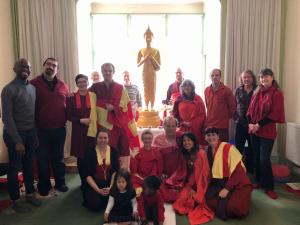 This time last week, the temple was full of people for our annual Bodhi retreat. Maitrisimha and Annetta came from Holland, Vajrapala and Daniel from Belgium, Susthama and her two children from Watford…
This time last week, the temple was full of people for our annual Bodhi retreat. Maitrisimha and Annetta came from Holland, Vajrapala and Daniel from Belgium, Susthama and her two children from Watford…
I’ve known these people for many years now, and we’ve been through a lot together. They are deeply important to me. They’ve become like family. And, just like with family, I get into all sorts of horrible tangles with them.
These tangles start before anyone arrives, when I start to feel entirely responsible for their well-being and feel that, if I can just plan with enough detail, then everyone will be happy all the time. This includes making sure I’ve baked enough cookies, sent out enough clear information about how things will work, organised the cooking rota to perfection…
This ‘feeling responsible for everyone’ role is an old and familiar one. It is more likely to rear its head in some circumstances than in others. This includes times when I do have some objective responsibility for people (like when they are on retreat in the temple), and times when the people involved remind me of family in some way.
This role developed for a good reason when I was younger, to keep me safe. It has my best interests at heart. It helps me to avoid feeling out of control, and to try and prevent other people from being upset with me. All the roles we play, whether or not they seem to, are an attempt at looking after us or other people. Unfortunately, they then take on a ‘life of their own’, and keep going regardless of whether our circumstances have changed. Sometimes they don’t even know that we’re now a grown-up.
There are advantages to this ‘responsible for others’ role of mine. It does mean that I am extremely organised, and that I ‘tune in’ to the needs of others and am responsive to any needs that arise. It means that people feel cared about, and that everyone always has enough cookies…
The main disadvantage of this habitual role is that it’s utterly exhausting! But there are other losses. I prevent other people from stepping up or from noticing what is needed, as I’m always in there first. I deny myself the opportunity of leaning into and trusting other people. I don’t respect others enough to let them have their own experience, without trying to manipulate it. Etc.
Catching myself play this role doesn’t always help me to step out of it right away, but it does weaken the hold it has over me. I can begin to experiment with NOT making the apple crumble I’d promised everyone, because I’m not feeling well. (I didn’t, and they survived.) I can get better at asking people for help. (I did, and it made them happy to offer something to the retreat.) I can smile fondly at myself when I get completely frantic, and give the frightened and compulsive part of me a hug, even as it’s rushing on to try and organise something else.
Maybe I’ll manage to step further away from this role when we organise our next retreat, and maybe I won’t. Either way, Amida Buddha sees me and accepts me just as I am.
What roles do you end up playing in your family, your friends or your workplace? What advantages do these roles have? What disadvantages? What might happen if you stepped out of them a little? Can you feel compassion towards these parts of yourself? Can you imagine that the Buddha or the Universe loves you just as you are?











